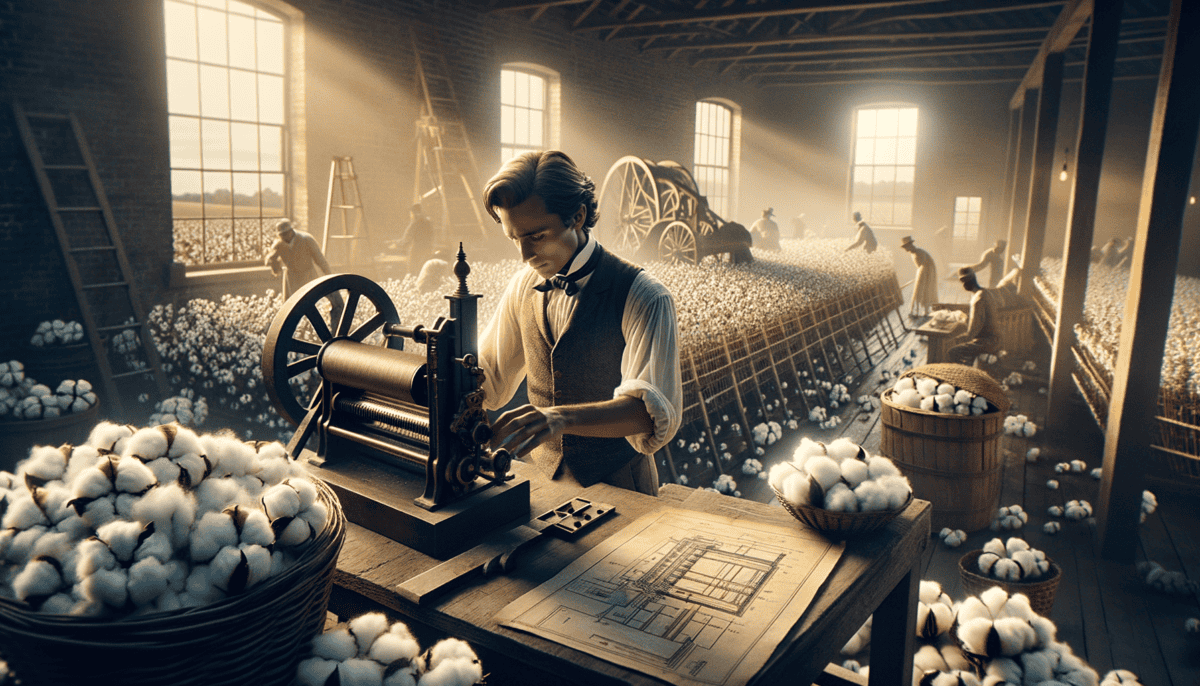Dreams and Cotton Seeds
Young Eli Whitney wiped sweat from his forehead as he tinkered with gears and springs in his father's workshop. The year was 1778, and the small town of Westborough, Massachusetts buzzed with the sounds of early American life.
"What are you making now, Eli?" his father asked, watching his ten-year-old son's nimble fingers work.
"A new kind of nail-making tool," Eli replied, not looking up from his work. "It'll make them faster than doing it by hand."
Even as a child, Eli loved to solve problems. While other kids played games, he took apart his father's watch to see how it worked. When his father wasn't looking, he borrowed tools to build new things in the workshop.
The workshop was Eli's favorite place. The smell of wood shavings and metal filled the air. Clink, clank, clink went his tools as he worked. He learned to make nails, hat pins, and walking canes. Soon, everyone in town knew about the clever Whitney boy who could fix almost anything.
"Why do you spend so much time making things?" his sister asked one day.
Eli smiled and said, "Because there's always a better way to do things. I want to help people work smarter, not harder."
Years passed, and Eli grew into a tall, curious young man. He worked hard to save money for school. His dream was to go to college and learn more about machines and science.
“Knowledge and learning are the keys to making the world better,” Eli would often say.
Finally, at age 23, Eli packed his bags for Yale College. His family and friends gathered to say goodbye.
"Remember son," his father said, putting a hand on his shoulder, "your mind is your greatest tool."
At Yale, Eli studied harder than ever. He learned about math, science, and the new machines changing America. But his biggest adventure was yet to come.
After graduation, Eli got an invitation to go south to Georgia. He would work as a teacher for a wealthy family. Little did he know, this journey would lead him to an invention that would change America forever.
As his ship sailed toward Georgia, Eli watched the coastline appear. The warm southern breeze carried the smell of salt water and possibility. He didn't know it yet, but he was about to see a problem that needed solving – a big problem with little white cotton seeds.
The air felt different here in the South – warmer, heavier with promise. Young Eli Whitney was about to begin the adventure of his life.
The carriage bounced along the dirt road toward the Greene plantation. Eli looked out at endless fields of white cotton plants. Workers moved slowly through the rows, picking cotton by hand.
"Why do they look so tired?" Eli asked his fellow passenger.
"It's the cotton seeds," the man replied. "They're a devil to remove. Takes all day just to clean a pound of cotton."
Eli's inventor mind began to spin. There has to be a better way, he thought. There's always a better way.
Seeds of Change
The warm Georgia sun beat down as Eli walked through rows of cotton plants at Mulberry Grove plantation. His hands reached out to touch the fluffy white bolls.
“These tiny seeds are the whole problem,” Mrs. Catherine Greene said, showing Eli how the green seeds stuck stubbornly to the cotton fibers. “It takes a whole day for one person to clean just one pound of cotton.”
Eli watched as workers sat for hours, carefully picking seeds out by hand. Their fingers moved slowly, tired from the tedious work.
That night, Eli couldn’t sleep. His mind kept working on the problem. He sat at his desk, drawing pictures of different machines that might help. ✏️
“There must be a way to make this faster,” he mumbled, scratching out another drawing.
The next morning, Eli watched Mrs. Greene’s cat playing with a ball of yarn. Its claws caught the threads, pulling them apart. Suddenly, his eyes grew wide.
“That’s it!” he shouted, making Mrs. Greene jump. “Wire hooks could pull the cotton through small holes – too small for the seeds to fit!”
Excited, Eli ran to the workshop. He found some wood, wire, and metal tools. His hands moved quickly as he built his first try at a cotton-cleaning machine.
For weeks, Eli worked from sunrise to sunset. Sometimes things broke. Sometimes his ideas didn’t work. But he never gave up.
Day after day, Eli tested new ideas:
– Thinner wires
– Different sized holes
– Stronger turning handles
“What are you making, Mr. Whitney?” asked young Tom, Mrs. Greene’s son.
“I’m making something that will change everything,” Eli answered, turning a wooden crank. “Watch this!”
He put some seedy cotton into his machine. As he turned the handle, clean white cotton came out one side, and green seeds fell out the other.
“It works!” Mrs. Greene clapped her hands. “Eli, you’ve done it!”
They called it the “cotton gin” – gin being short for engine. In one day, it could clean as much cotton as fifty people working by hand.
News of Eli’s invention spread fast. Farmers came from miles around to see the machine that could clean cotton so quickly.
“This will make us rich!” one farmer said.
“We can plant more cotton than ever before!” said another.
Eli smiled, proud of his invention. But he didn’t know that his simple machine would soon change the whole country in ways he never imagined.
As the sun set over Mulberry Grove, Eli watched his cotton gin spin. He had solved the puzzle of the stubborn seeds, but bigger challenges lay ahead. The real test would be protecting his invention from those who wanted to copy it without permission.
The Machine That Changed America
Spring arrived in Georgia, and Eli Whitney’s cotton gin was causing quite a stir. More and more people wanted to see his amazing invention.
Mrs. Greene hosted a special demonstration day at Mulberry Grove. Farmers traveled from all around to watch the cotton gin work its magic.
“Step right up!” Eli called out to the crowd. “Watch how quickly this machine cleans the cotton!”
The crowd gasped as Eli poured seedy cotton into his machine. The wooden handle turned smoothly, and clean white cotton puffed out like clouds.
“This is amazing!” shouted one farmer. “Your machine does the work of fifty people!”
But not everyone was happy to pay for Eli’s invention. Late one night, someone broke into his workshop.
“The cotton gin! It’s gone!” Eli discovered the next morning. His heart sank when he saw the empty workbench.
“Don’t worry,” Mrs. Greene patted his shoulder. “We’ll help you build another one.”
Soon, copied versions of Eli’s cotton gin appeared all over the South. Farmers built their own machines without asking permission.
Changes swept across the southern states:
– Cotton fields grew bigger
– More workers were needed
– New cotton farms opened everywhere
Eli tried to protect his invention with a patent – a special paper that said the cotton gin belonged to him. But many people ignored it.
“It’s not fair,” Eli said to Mrs. Greene. “I worked so hard to invent this machine.”
“Your invention is changing everything,” she replied. “Look at all the cotton being grown now!”
She was right. Cotton plants stretched across fields as far as the eye could see. Boats loaded with cotton sailed down rivers to big cities.
Eli watched his invention transform the South. But the changes weren’t all good. More cotton meant more workers were needed in the fields. More people were forced to work as slaves.
“I wanted to help make things better,” Eli said quietly. “I never thought it would cause such big changes.”
The cotton gin made some people very rich. But it also made life harder for many others. Eli’s simple machine had started something much bigger than he ever imagined.
As summer turned to fall, cotton gins hummed across the countryside. Eli knew he needed to fight for his rights as an inventor. But first, he had to figure out how to make people follow the rules and respect his patent.
Standing Up for His Rights
The morning sun filtered through the dusty windows of the courthouse in Savannah, Georgia. Eli Whitney stood tall, his patent papers clutched tightly in his hands.
“Your Honor,” Eli said, his voice steady. “People are stealing my invention. They’re building cotton gins without my permission.”
The judge peered down at Eli over his glasses. “Tell us what happened, Mr. Whitney.”
Eli took a deep breath. “I worked very hard to create the cotton gin. But now everyone is copying it. They’re making money from my idea without paying me.”
“But sir,” a farmer stood up. “We need these machines! Cotton is our life now.”
All around the South, cotton was king. Farmers were getting rich using copied versions of Eli’s invention. But Eli himself wasn’t making any money from it.
“I’ve counted over a hundred cotton gins that look just like mine,” Eli told the court. “Not one of those people asked for my permission.”
Mrs. Greene sat in the back of the courtroom, giving Eli encouraging smiles. She knew how much this meant to him.
Day after day, Eli went to different courts to fight for his rights. It was hard work, and it cost him lots of money. Sometimes he felt like giving up.
“Why do you keep trying?” a friend asked him one evening.
“Because inventors need to be protected,” Eli answered. “If people can just steal our ideas, why would anyone want to invent new things?”
The legal battles were long and tiring. Eli spent more time in courtrooms than in his workshop now. His money was running out, and he was getting worried.
“Maybe I should have kept my invention a secret,” he said to Mrs. Greene one day.
“No, Eli,” she replied firmly. “Your cotton gin has changed farming forever. You should be proud of that.”
But the changes weren’t just about farming. The whole country was different now:
Life in the South centered around cotton
Big plantations grew bigger
Cities got busy with cotton trade
Finally, after years of fighting, Eli won some of his court cases. But it was too late – his patent was almost expired, and he had spent most of his money on lawyers.
“At least I showed them that inventors have rights,” he said, looking at his workshop. “Maybe it will be easier for the next person who invents something important.”
Eli learned a hard lesson: sometimes creating something new is just the beginning of the journey. Protecting your ideas can be just as challenging as inventing them.
As Eli packed up his legal papers, he thought about his next steps. Maybe it was time to try inventing something new – something that would change things for the better.
A Heavy Heart
Eli Whitney sat in his study on a cool autumn evening, watching cotton wagons roll past his window. His invention had changed everything, but not in the way he had hoped.
“Look at what we’ve done with your machine, Mr. Whitney!” a plantation owner called out proudly. “We’re growing more cotton than ever!”
Eli didn’t smile back. His heart felt heavy. The cotton gin was supposed to make life better, but something else was happening instead.
“Mrs. Greene,” Eli said to his old friend one day, “I see more slave ships in the harbor now than ever before.”
Catherine Greene nodded sadly. “The plantations need more workers because they’re growing so much cotton.”
The changes were everywhere:
Fields of cotton stretched as far as the eye could see
More people were being forced to work as slaves
The South was becoming different from the North
One morning, Eli received a letter from a Northern friend: “Your cotton gin has made the South rich, but at what cost?”
Eli walked through the bustling streets of Georgia, watching cotton bales being loaded onto ships. He remembered his simple dream of helping farmers work faster.
“I never meant for this to happen,” Eli told his workshop assistant. “I wanted to solve a problem, not create bigger ones.”
The assistant looked up from cleaning a cotton gin. “But you can’t control how people use your inventions, Mr. Whitney.”
Eli picked up a handful of cotton seeds. They felt small and harmless in his palm. How could something so simple change so much?
“Sometimes the smallest things can have the biggest effects,” he whispered to himself.
That night, Eli wrote in his journal: “My machine has made cotton easier to clean. But it has also made some problems bigger. I wonder if other inventors feel this way too.”
As he looked out his window at the moon, Eli thought about his next steps. Maybe he could invent something else – something that would help make things right.
Mrs. Greene found him still writing late that night. “What will you do now, Eli?”
“I’m thinking about new ideas,” he replied. “Maybe something that could help everyone, not just some people.”
The cotton gin had taught Eli an important lesson: every invention can change the world in unexpected ways. Now he knew he had to think carefully about what those changes might be.
As dawn broke over the horizon, Eli was already at his workbench, sketching new ideas. He couldn’t change the past, but he could still shape the future.
A New Beginning
The morning sun streamed through Eli Whitney’s workshop window as he packed away his tools. He had made a big decision – it was time to try something new.
“I’ve been thinking,” he told Catherine Greene, “about making guns in a whole new way.”
His eyes sparkled with excitement for the first time in months. This time, he would make sure his invention helped everyone.
“But how will that help people?” Catherine asked, curious about his new path.
Eli picked up two metal pieces from his workbench. “Watch this,” he said with a smile. He showed how the parts fit together perfectly, just like puzzle pieces.
His new way of making things would change factories forever:
– Workers could make parts faster
– Broken things would be easier to fix
– More people could afford useful tools
“This is what I should have been doing all along,” Eli said, his voice full of hope. “Making things that bring people together instead of keeping them apart.”
Years later, Eli stood in his new factory in New Haven, Connecticut. Workers moved around him, each making different parts that would fit together perfectly.
“Mr. Whitney,” a young apprentice called out, “you’ve taught us that every piece matters, just like every person matters.”
Eli smiled warmly. His heart felt lighter now. The cotton gin had taught him hard lessons, but those lessons helped him make better choices.
“Remember,” he told his workers, “we’re not just making things – we’re making the future better.”
As he walked through his factory, Eli thought about his journey. From a curious boy making nails to a man whose ideas changed America.
One spring morning, Eli received a letter from President Adams praising his new manufacturing methods. But the real reward was seeing his workers proud of what they made.
“You see, Mrs. Greene,” he said to his old friend who had come to visit, “every invention should make the world a little bit better for everyone.”
As the sun set on his factory, Eli Whitney knew he had finally found his true purpose. His story would inspire others to think carefully about how their ideas could help all people. ⭐
Today, we remember Eli Whitney not just for the cotton gin, but for showing us that we can learn from our mistakes and use that wisdom to make the world better.
And so, the boy who once dreamed of solving problems grew into a man who learned that the best inventions are those that bring hope and help to everyone.






